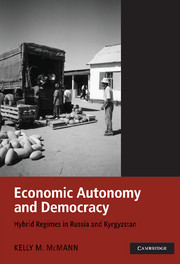Book contents
- Frontmatter
- Contents
- List of Figures
- List of Tables
- Acknowledgments
- Notes on Transliteration
- Economic Autonomy and Democracy
- 1 Capitalism, Democracy, and Economic Autonomy
- 2 The Concept of Economic Autonomy
- 3 Measurement of Democracy
- 4 Activism under the State's Thumb
- 5 Illustrations of Economic Autonomy
- 6 Hybrid Regimes
- Appendix A Description of Surveys
- Appendix B Alternative Explanations
- Appendix C List of Interviews
- Appendix D Measurement of Eight Guarantees of Democracy
- References
- Index
1 - Capitalism, Democracy, and Economic Autonomy
Published online by Cambridge University Press: 01 September 2009
- Frontmatter
- Contents
- List of Figures
- List of Tables
- Acknowledgments
- Notes on Transliteration
- Economic Autonomy and Democracy
- 1 Capitalism, Democracy, and Economic Autonomy
- 2 The Concept of Economic Autonomy
- 3 Measurement of Democracy
- 4 Activism under the State's Thumb
- 5 Illustrations of Economic Autonomy
- 6 Hybrid Regimes
- Appendix A Description of Surveys
- Appendix B Alternative Explanations
- Appendix C List of Interviews
- Appendix D Measurement of Eight Guarantees of Democracy
- References
- Index
Summary
“My wife asked me to not be involved in politics so that I could feed our family,” a middle-aged man in the former Soviet Union recounted to me in 1997. This simple, pragmatic statement reveals a fundamental way in which capitalism influences democracy. Specifically, capitalism acts on democracy through individuals' assessments of their economic autonomy, or their ability to earn a living independent of the state. With the end of Soviet communism in 1991, this man became actively involved in democratic politics. He founded a branch of a political party, which supported candidates for regional and national elections. “When I created the party, I did not think there would be risks,” he explained. He had assumed that greater political freedom in the late Soviet period meant that he no longer had to fear government reprisals for oppositional activity. He was wrong. Provincial authorities fired this man from his job as a school director three times between 1991 and 1997 as punishment for his political activism. Meanwhile, his organization dwindled from 100 to 12 members as others faced similar workplace harassment. Unable to find a job beyond the reach of local officials, the man decided to abandon the party. He and his fellow leaders dissolved the organization, even though the party was thriving in other regions of the country.
This story is typical of the accounts I heard from current and former activists in post-Soviet countries.
- Type
- Chapter
- Information
- Economic Autonomy and DemocracyHybrid Regimes in Russia and Kyrgyzstan, pp. 1 - 27Publisher: Cambridge University PressPrint publication year: 2006



